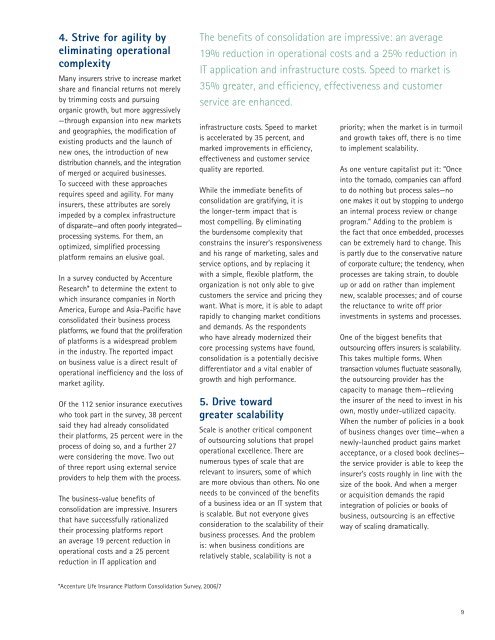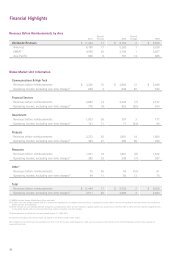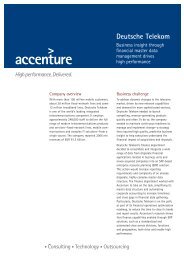Operational Excellence
Operational Excellence
Operational Excellence
Create successful ePaper yourself
Turn your PDF publications into a flip-book with our unique Google optimized e-Paper software.
4. Strive for agility by<br />
eliminating operational<br />
complexity<br />
Many insurers strive to increase market<br />
share and financial returns not merely<br />
by trimming costs and pursuing<br />
organic growth, but more aggressively<br />
—through expansion into new markets<br />
and geographies, the modification of<br />
existing products and the launch of<br />
new ones, the introduction of new<br />
distribution channels, and the integration<br />
of merged or acquired businesses.<br />
To succeed with these approaches<br />
requires speed and agility. For many<br />
insurers, these attributes are sorely<br />
impeded by a complex infrastructure<br />
of disparate—and often poorly integrated—<br />
processing systems. For them, an<br />
optimized, simplified processing<br />
platform remains an elusive goal.<br />
In a survey conducted by Accenture<br />
Research* to determine the extent to<br />
which insurance companies in North<br />
America, Europe and Asia-Pacific have<br />
consolidated their business process<br />
platforms, we found that the proliferation<br />
of platforms is a widespread problem<br />
in the industry. The reported impact<br />
on business value is a direct result of<br />
operational inefficiency and the loss of<br />
market agility.<br />
Of the 112 senior insurance executives<br />
who took part in the survey, 38 percent<br />
said they had already consolidated<br />
their platforms, 25 percent were in the<br />
process of doing so, and a further 27<br />
were considering the move. Two out<br />
of three report using external service<br />
providers to help them with the process.<br />
The business-value benefits of<br />
consolidation are impressive. Insurers<br />
that have successfully rationalized<br />
their processing platforms report<br />
an average 19 percent reduction in<br />
operational costs and a 25 percent<br />
reduction in IT application and<br />
*Accenture Life Insurance Platform Consolidation Survey, 2006/7<br />
The benefits of consolidation are impressive: an average<br />
19% reduction in operational costs and a 25% reduction in<br />
IT application and infrastructure costs. Speed to market is<br />
35% greater, and efficiency, effectiveness and customer<br />
service are enhanced.<br />
infrastructure costs. Speed to market<br />
is accelerated by 35 percent, and<br />
marked improvements in efficiency,<br />
effectiveness and customer service<br />
quality are reported.<br />
While the immediate benefits of<br />
consolidation are gratifying, it is<br />
the longer-term impact that is<br />
most compelling. By eliminating<br />
the burdensome complexity that<br />
constrains the insurer’s responsiveness<br />
and his range of marketing, sales and<br />
service options, and by replacing it<br />
with a simple, flexible platform, the<br />
organization is not only able to give<br />
customers the service and pricing they<br />
want. What is more, it is able to adapt<br />
rapidly to changing market conditions<br />
and demands. As the respondents<br />
who have already modernized their<br />
core processing systems have found,<br />
consolidation is a potentially decisive<br />
differentiator and a vital enabler of<br />
growth and high performance.<br />
5. Drive toward<br />
greater scalability<br />
Scale is another critical component<br />
of outsourcing solutions that propel<br />
operational excellence. There are<br />
numerous types of scale that are<br />
relevant to insurers, some of which<br />
are more obvious than others. No one<br />
needs to be convinced of the benefits<br />
of a business idea or an IT system that<br />
is scalable. But not everyone gives<br />
consideration to the scalability of their<br />
business processes. And the problem<br />
is: when business conditions are<br />
relatively stable, scalability is not a<br />
priority; when the market is in turmoil<br />
and growth takes off, there is no time<br />
to implement scalability.<br />
As one venture capitalist put it: “Once<br />
into the tornado, companies can afford<br />
to do nothing but process sales—no<br />
one makes it out by stopping to undergo<br />
an internal process review or change<br />
program.” Adding to the problem is<br />
the fact that once embedded, processes<br />
can be extremely hard to change. This<br />
is partly due to the conservative nature<br />
of corporate culture; the tendency, when<br />
processes are taking strain, to double<br />
up or add on rather than implement<br />
new, scalable processes; and of course<br />
the reluctance to write off prior<br />
investments in systems and processes.<br />
One of the biggest benefits that<br />
outsourcing offers insurers is scalability.<br />
This takes multiple forms. When<br />
transaction volumes fluctuate seasonally,<br />
the outsourcing provider has the<br />
capacity to manage them—relieving<br />
the insurer of the need to invest in his<br />
own, mostly under-utilized capacity.<br />
When the number of policies in a book<br />
of business changes over time—when a<br />
newly-launched product gains market<br />
acceptance, or a closed book declines—<br />
the service provider is able to keep the<br />
insurer’s costs roughly in line with the<br />
size of the book. And when a merger<br />
or acquisition demands the rapid<br />
integration of policies or books of<br />
business, outsourcing is an effective<br />
way of scaling dramatically.<br />
9

















